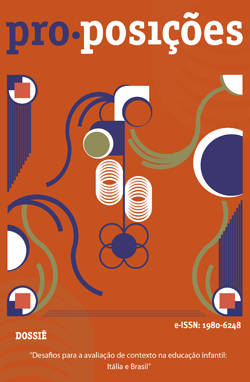Abstract
In the history of the development of the teaching and learning process, the teacher’s figure has always been regarded as having fundamental importance for students to develop their cognitive, emotional, and ethical capacities. However, in the digital culture society, there are indications of radical changes in this relationship, mainly because students access information, algorithmically located, through their electronic devices, especially their cellphones. In this context, the main objective of this article is to critically reflect on how teacher authority is gradually subsumed in relation to digital algorithmic authority. It is concluded that the critique of this process of subordination becomes necessary to think how teachers and students can become authors and architects of the teaching and learning process through the use of digital technology.
References
Algoritmo. (2018). In Michaelis: Dicionário Brasileiro da Língua Portuguesa. Recuperado de http://michaelis.uol.com.br/palavra/4lD9/algoritmo/.
Anders, G.(2002). Die Antiquiertheit des Menschen I. München: C. H. Beck.
Arendt, H. (2009). Entre o passado e o futuro (M. W. Barbosa, trad.). São Paulo: Ática. E
Beer, D. (2012). Open access and academic publishing: Some lessons from music culture. Political Geography, (31), 256-259.
Beer, D. (2016). The social power of algorithms. Information, Communication & Society, 20(1), 1- 13.
Bucher, T. (2012). Want to be on the top? Algorithmic power and the threat of invisibility on Facebook. New Media & Society, 14(7), 1-17.
Bucher, T. (2017). The algorithmic imaginary: Exploring the ordinary affects of Facebook algorithms. Information, Communication & Society, 20(1), 30-44.
Comênio, J. A. (1985). Didáctica magna (J. F. Gomes, trad.). Lisboa: Editora da Fundação Calouste Gulbenkian.
Crary, J. (2015). 24/7: Capitalismo tardio e os fins do sono (J. Toledo Jr., trad.). São Paulo: Cosac Naify, 2015.
Greenfield, A. (2017). Radical technologies: The design of everyday life. London: Verso.
Herbart, J. F. (2003). Pedagogia geral (L. Scheidl, trad.). Lisboa: Fundação Calouste Gulbenkian.
Kant, I. (2005). Resposta à pergunta: Que é esclarecimento? In Textos seletos (F. S. Fernandes, trad., pp. 100-108). Petrópolis: Vozes.
Lash, S. (2007). Power after hegemony: Cultural studies in mutation? Theory, Culture & Society, 24(3), 55-78.
Lima, M. (2018, 15 de abril). Como em episódio da série ‘Black Mirror’, China vai dar notas a cidadãos. Estadão: Link. Recuperado de http://link.estadao.com.br/noticias/geral,como-em-episodio-da-serie-blackmirrorchina-vai-dar-notas-a-cidadaos,70002268857.
Mager, A. (2012). Algorithmic ideology. Information, Communication & Society, 15(5), 769-787.
Manacorda, M. A. (1989). História da educação: Da antiguidade aos nossos dias (G. L. Mônaco, trad.). São Paulo: Cortez.
Mackenzie, A., & Vurdubakis, T. (2011). Codes and codings in crisis: Signification, performativity and excess. Theory, Culture & Society, 28(3), 3-23.
Pasquale, F. (2015). The black box society: The secret algorithms that control money and information. Cambridge: Harvard University Press.
Postman, N. (2005). O desaparecimento da infância. (S. M. A. Carvalho & J. L. Melo, trads.). Rio de Janeiro: Graphia Editorial.
Rosa, H. (2016). Beschleunigung: die Veränderung der Zeitskulturen in der Moderne. Franfkfurt am Main: Suhrkamp Verlag.
Rousseau, J. J. (1992). Emílio ou da educação (S. Milliet, trad.). Rio de Janeiro: Bertrand Brasil.
Skinner, B. F. (1972). Tecnologia do ensino (R. Azzi, trad.). São Paulo: Editora Pedagógica e Universitária. Tomás de Aquino. (1988). Coleção Os pensadores: Sto.
Tomás e Dante (L. J. Baraúna, trad.). São Paulo: Nova Cultural.
Türcke, C. (2016). Hiperativos! Abaixo a cultura do déficit de atenção (J. P. Antunes, trad.). Rio de Janeiro: Paz e Terra.
Van Dijck, J. (2004). Memory matters in the digital age. Configutations, 12(3), 349-373.
Van Dijck, J. (2013). The culture of connectivity: A critical history of social media. Oxford: Oxford University Press.
Van House, N., & Churchill, E. F. (2008). Technologies of memory: Key issues and critical perspectives. Memory Studies, 1(3), 295-310.
A Proposições utiliza a licença do Creative Commons (CC), preservando assim, a integridade dos artigos em ambiente de acesso aberto.


